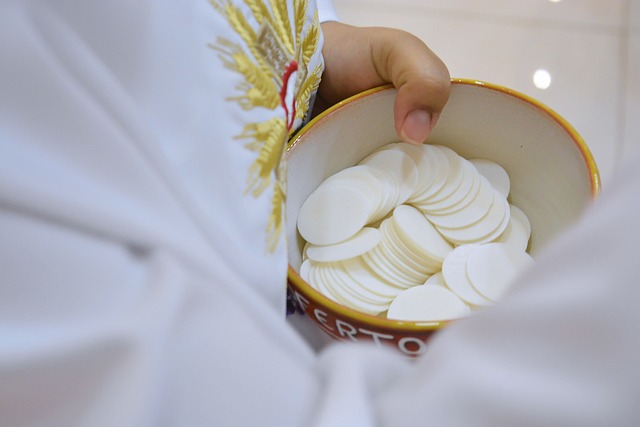Allow Your Mind To Be Transformed By A Spiritual Revolution

In Ephesians 4:17-24, St. Paul urges us to reject the ways of the Gentiles and embrace a spiritual revolution of the mind. He calls us to “put off the old self” and “be renewed in the spirit of your minds,” leading a life characterized by righteousness and holiness. This transformation is not superficial but a profound change that aligns our thoughts, actions, and hearts with God’s truth.
This message is further illuminated in John 6:27, where Jesus tells us, “Do not work for food that cannot last, but work for food that endures to eternal life, the kind of food the Son of Man is offering you.” Here, Jesus emphasizes the importance of seeking spiritual nourishment over worldly pursuits. The Eucharist, the true food He offers, becomes central to this spiritual journey.
The Call to Transformation
Paul’s exhortation to the Ephesians is a call to a profound transformation, urging them to undergo a spiritual revolution in their minds. This isn’t just a subtle change but a radical reorientation of their entire way of thinking and living. To fully embrace this new life in Christ, we must break away from old, destructive patterns and sever ties with toxic influences that hinder our spiritual growth.
A spiritual revolution means making firm, sometimes difficult decisions to avoid environments and relationships that lead us away from God’s truth. It involves surrounding ourselves with supportive communities and engaging in practices that nurture our faith. This radical renewal is about turning our hearts and minds towards Christ, allowing His love and truth to reshape our lives completely. This revolution is about opening wide our hearts to receive Jesus who gives himself to us in the most Holy Eucharist.
The Eucharist: Spiritual Nourishment and Transformation
The Eucharist stands at the heart of our spiritual journey, offering profound spiritual nourishment and transformation. When Jesus said, “Do not work for food that cannot last, but work for food that endures to eternal life” (John 6:27), He was pointing us to the true sustenance that the Eucharist provides.
Participating in the Eucharist is much more than a ritual; it is an intimate encounter with Christ Himself. In receiving the body and blood of Jesus, we are united with Him in a deep and mysterious way. This sacrament is a source of grace that strengthens our faith, renews our spirit, and sustains us on our journey towards eternal life.
Regular reception of the Eucharist helps to deepen our relationship with God. It infuses our lives with divine grace, enabling us to overcome the challenges and temptations we face daily. This spiritual nourishment fortifies us, making it possible to live out our faith with greater conviction and love.
Understanding the significance of the Eucharist compels us to approach it with reverence and a pure heart. The Church teaches that we should not receive the Eucharist while in a state of grave sin. Therefore, frequent participation in the sacrament of reconciliation is crucial. This practice ensures that we receive the Eucharist worthily, free from the barriers of sin that separate us from God’s grace.
Moreover, the Eucharist inspires us to live out the love and sacrifice of Christ in our own lives. It calls us to be His hands and feet in the world, serving others selflessly and spreading His message of hope and salvation. This active faith means engaging in acts of charity, justice, and mercy, reflecting the love we receive from the Eucharist to those around us.
In essence, the Eucharist is not just spiritual food; it is a transformative encounter that reshapes our lives. It draws us closer to Christ, empowers us to live according to His teachings, and inspires us to serve others. By making the Eucharist central to our lives, we embrace the spiritual revolution that Paul speaks of in Ephesians, allowing God’s grace to renew our minds and guide our actions.
As we grow in our love for the Eucharist, it becomes an integral part of who we are. This love drives us to attend Mass, not out of obligation, but out of a genuine desire to connect with Christ. Even if we don’t fully understand it, the Eucharist draws us closer to Jesus and deepens our faith. It’s essential to approach it with a pure heart, seeking reconciliation and avoiding sin to receive it worthily.
Living Out the Eucharist
The Eucharist not only nourishes us spiritually but also calls us to live out our faith in tangible ways. This sacrament is a profound reminder of Christ’s love and sacrifice, and it compels us to reflect that love in our daily lives. Living out the Eucharist means embodying the principles and values that Jesus taught, becoming true disciples in our actions and interactions.
Firstly, living out the Eucharist involves a commitment to service. Jesus washed the feet of His disciples, teaching us to serve one another with humility and love. We are called to follow His example by engaging in acts of charity, reaching out to those in need, and offering our time and resources to help others. This could mean volunteering at a local shelter, supporting community initiatives, or simply being there for a friend in need. Our actions, fueled by the grace received in the Eucharist, become a testament to Christ’s love.
Secondly, living out the Eucharist challenges us to promote justice and peace. The Eucharist calls us to be peacemakers in a world often marred by conflict and division. This involves standing up against injustice, advocating for the marginalized, and working towards creating a more just and equitable society. Whether it’s participating in social justice movements, raising awareness about important issues, or simply treating everyone with respect and dignity, our faith becomes a force for positive change.
Additionally, the Eucharist encourages us to live lives of integrity and authenticity. As we partake in the body and blood of Christ, we are reminded of the importance of aligning our lives with the teachings of the Gospel. This means being honest, ethical, and consistent in our beliefs and actions. It involves striving to live in a way that reflects our faith, even when it is challenging or inconvenient.
Moreover, living out the Eucharist means fostering a spirit of community and unity. The Eucharist brings us together as the Body of Christ, transcending individual differences and uniting us in faith. We are called to build and nurture relationships within our faith communities, supporting and encouraging one another in our spiritual journeys. This could involve participating in parish activities, joining faith-sharing groups, or simply being a source of support and encouragement for others.
Finally, living out the Eucharist calls us to evangelize. The transformative power of the Eucharist fills us with the desire to share the Good News of Christ with others. This doesn’t necessarily mean preaching on street corners, but rather living in a way that naturally draws others to Christ. Our lives, filled with love, joy, and peace, become a testimony to the presence of Christ within us, inspiring others to seek Him.
Truth and Transformation
In our spiritual journey, recognizing and embracing truth is crucial for genuine transformation. The scripture passage from Ephesians 4:17-24 speaks to the importance of turning away from falsehoods and embracing the truth found in Christ. This truth is not relative or subjective but absolute and eternal.
Christians have the choice to accept or reject this truth, just as those who listened to Jesus in John 6 faced the same decision. When Jesus declared, “I am the living bread that came down from heaven” (John 6:51), some found His words hard to accept and chose to walk away. Despite their disbelief, the truth of Jesus being the Bread of Life remained unchanged. Their rejection did not alter the reality of His divine nature and the eternal life He offers.
This choice to accept or reject the truth is still relevant today. In a world where many choose to walk away from or distort the truth, the essence of what is true remains constant. Truth is not subject to personal opinions or societal trends; it stands firm regardless of human acceptance or denial.
Living in the truth of Christ requires a commitment to ongoing transformation. It involves a continual renewal of our minds, as Paul urges in Ephesians. This renewal means shedding old patterns of thought and behavior that are rooted in falsehood and sin. Instead, we are called to embrace the new self, created to be like God in true righteousness and holiness.
Transformation through truth also entails making difficult choices. Just as the disciples in John 6 had to decide whether to follow Jesus or leave, we too must choose to align our lives with the truth of the Gospel. This may mean letting go of relationships, habits, or environments that hinder our spiritual growth. It might require us to stand firm in our faith even when it is unpopular or challenging.
Moreover, truth compels us to act with integrity. Embracing the truth of Christ means living authentically, allowing our actions to reflect our beliefs. It involves speaking the truth in love, standing up for justice, and being a beacon of light in a world often shrouded in darkness.
Ultimately, the transformation brought about by embracing truth is not just personal but communal. As members of the Body of Christ, we are called to support and encourage one another in our pursuit of truth. This collective journey helps to strengthen our faith and fortify our commitment to living out the Gospel.
Therefore, accepting and living in the truth of Christ is essential for our spiritual transformation. Despite the choices of others to walk away or reject this truth, its reality remains unaltered. By embracing this truth, we undergo a profound spiritual revolution, aligning our lives with God’s will and reflecting His love and righteousness to the world.
Conclusion
Connecting the teachings of Ephesians 4:17-24 and John 6:27 reveals the critical role of truth and transformation in our Christian journey. The Eucharist stands at the heart of this transformation, providing the spiritual nourishment and grace needed to live out our faith. Embracing the truth of Christ and the power of the Eucharist helps us to renew our minds, live righteously, and serve others with love and compassion.
Prayer
Heavenly Father,
We come before You with grateful hearts, seeking Your guidance and grace. As we reflect on the words of St. Paul in Ephesians, we ask for Your strength to turn away from the ways of the world that lead us astray. Help us to embrace the truth that is found in Christ, and to be renewed in the spirit of our minds.
Lord, grant us a spiritual revolution within our hearts and minds. Transform our thoughts and desires, so that they align with Your holy will. May we put off our old selves, which are corrupted by deceitful desires, and be made new in the attitude of our minds. Clothe us in the new self, created to be like You in true righteousness and holiness.
As we contemplate the words of Your Son in John 6, we ask for the grace to seek not the food that perishes, but the food that endures to eternal life. Help us to recognize Jesus as the true Bread of Life, and to approach the Eucharist with reverence and love. May this sacrament nourish our souls and strengthen our resolve to live according to Your truth.
Father, we acknowledge that accepting and living in Your truth requires courage and commitment. Empower us to make the necessary changes in our lives, to let go of anything that hinders our relationship with You. Surround us with supportive communities that encourage us in our faith journey, and fill us with Your Holy Spirit to guide us each step of the way.
We pray for hearts that are open to Your transformative love. Renew our minds, so that our actions may reflect the grace and truth of Christ. Help us to live with integrity, to promote justice, and to serve others with humility and love. May our lives be a testimony to Your goodness and a beacon of hope in the world.
We ask this through Jesus Christ, our Lord, who lives and reigns with You and the Holy Spirit, one God, forever and ever. Amen.





